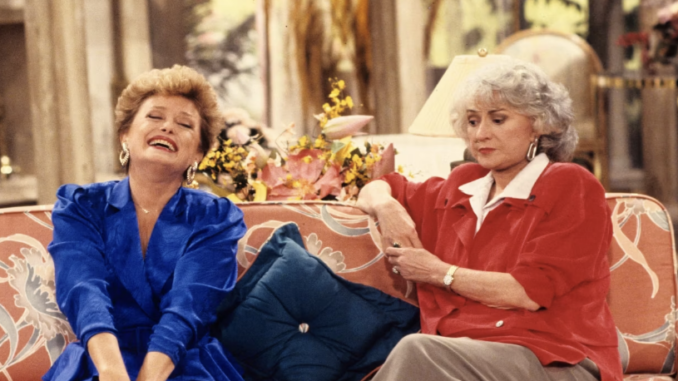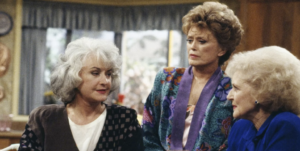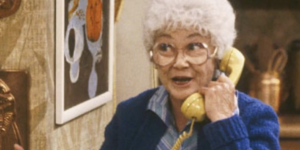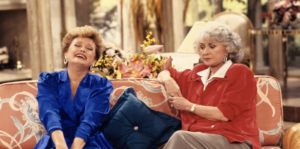
Over the course of its seven-season run, The Golden Girls tackled many issues. Whether it was ageism, sexism, or queer rights, the show went out of its way to address important subjects, an effort that contributed to its staying power. Rose (Betty White), Dorothy (Beatrice Arthur), Blanche (Rue McClanahan), and Sophia (Estelle Getty) became icons of liberation and education for many, even causing a few controversies along the way. Its popularity led to several spin-offs and a sequel series, The Golden Palace, most of which were helmed by Golden Girls creator Susan Harris.

Harris remains one of the most respected comedy writers of all time, having created some of television’s most renowned sitcoms. However, there was a curious period in the middle of the run of The Golden Girls when Harris began to suffer from an overpowering ailment. Harris would spend quite a bit of time searching for help but met less than favorable results. In true “Susan Harris”-fashion, she decided to take the issue to her international platform, building the struggles she and countless others faced right into the two-part Season 5 premiere. The result was one of the series’ most powerful episodes and a call to action aimed at the medical field.
Susan Harris Suffered from Chronic Fatigue Syndrome
Chronic Fatigue Syndrome (CFS) is a debilitating disease. According to the Mayo Clinic, CFS symptoms include “extreme exhaustion after physical or mental exercise,” “problems with memory or thinking skills,” “dizziness that worsens when lying down or sitting,” “muscle or joint pain,” and “unrefreshing sleep.” Per nursingclio.org, the first acknowledgment of the condition came with a 1934 outbreak in Los Angeles, but the Center of Disease Control would not officially recognize it or give it a name until 1987. Harris began feeling the symptoms of CFS at the height of The Golden Girls’ success, per Show Biz Cheat Sheet. While working on the show, Harris told Vulture: “I had all the symptoms, but had very bad experiences with doctors, some of whom told me to dye my hair a different color and asked whether Paul and I were getting along in our marriage.”

Cheat Sheet says that Harris would not be diagnosed until 1988, just one year after the CDC officially acknowledged the condition. Harris told Vulture that her husband, Paul Junger Witt, was reading an article about a woman with all the same symptoms. The piece claimed the subject had CFS, and Harris finally began to feel seen. Frustrated by how long it took to finally get answers, determined to help others, and, as Harris told Vulture, filled with a desire to get back at “all the doctors who didn’t believe,” she built her diagnosis into the two-part Season 5 premiere of The Golden Girls. The action gave the condition international attention and a voice to those who suffered from it.
‘The Golden Girls’ Brought International Attention to Chronic Fatigue Syndrome
Despite the fact that she was almost played by another actress, Beatrice Arthur’s Dorothy was usually the show’s voice on important issues. So, it wasn’t surprising that Harris wrote the important plot for the character. “Sick and Tired” parts 1 and 2 opened The Golden Girls’ fifth season. It’s revealed that, sometime during the hiatus, Dorothy began experiencing the symptoms of CFS, though she thinks it’s just the flu. Rose and Sophia are less certain, especially when Dorothy claims she wasn’t able to teach one day. She decides to visit a doctor.
Unable to get answers, her visits take her all around Miami. She receives comfort from her friend (and Empty Nests lead), Dr. Harry Weston (Richard Mulligan), though he cannot provide her with a diagnosis. From Dr. Stevens (Jeffery Tambor), she gets doubt. Despite Sophia’s protesting, Dr. Stevens is still cold during his examination of Dorothy and tells her to see Dr. Budd (Michael McGuire) in New York, claiming he’s the best neurologist in the country. Dorothy, however, is not met with good bedside manners at all.

Budd is the most dismissive practitioner yet and makes Dorothy feel as though she’s losing a grip on her sanity. Much of what he tells her is reminiscent, or in some cases, exactly derived from the statements Harris received when she sought her diagnosis. Budd even asks Dorothy about her dating life and recommends she dye her hair. In one final effort to find out what’s ailing her, Dorothy seeks the help of Dr. Chang (Keone Young), who finally gives Dorothy her diagnosis. He explains to Dorothy that many doctors don’t believe CFS exists because they “aren’t able to see it under their microscopes.” Dorothy is relieved to find out that this isn’t all in her head and, like Harris, is able to search for treatment. But Dorothy gets one chance Harris didn’t: Confront Dr. Budd directly. It’s in the final scene of “Sick and Tired (Part 2)” that Harris finally gets her revenge.
As the episode comes to an end, Dorothy, Blanche, Rose, and Sophia go out for a celebratory dinner. Much to Dorothy’s shock, she sees Dr. Budd dining at the same restaurant. Dorothy decides to confront him. She tells him of her diagnosis and just how he made her feel. The monologue includes powerful lines, such as, “I don’t know where you doctors lose your humanity, but you lose it. If all of you at the beginning of your careers could get very sick and scared for a while, you’d probably learn more from that than anything else. You’d better start listening to your patients. They need to be heard.” Arthur’s delivery is one of her best performances and is met with thunderous applause from the studio audience. But it was more than just a great moment for the character, the show, and television in general. It was a great moment for Susan Harris. After living through the pains of CFS, she gave international attention to the disorder, and she was finally able to tell off the foes who doubted her.

The Golden Girls was always known for taking a stand. But after living through the pain and suffering from Chronic Fatigue Syndrome, creator Susan Harris took one of the most brave steps possible when she wrote the newly researched disease into the show. Not only did she give a voice to those who had been turned away seeking help, she finally got revenge on the doctors who tried to turn her away.
